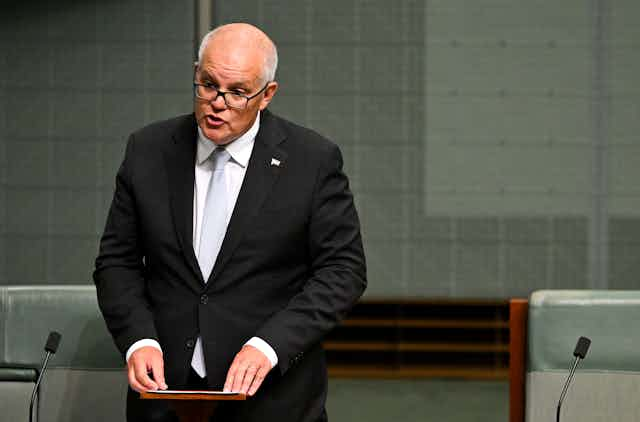Scott Morrison has accused the Robodebt royal commission of making wrong, unsubstantiated and absurd findings against him, in a detailed statement to parliament.
The former prime minister, who was excoriated by the commission, was unrepentant, giving no ground on any of the criticisms Commissioner Catherine Holmes made of him in her report.
He also accused the government of a “campaign of political lynching” to discredit him and his service to the country, once again weaponising “a quasi-legal process to launder [its] political vindictiveness”.
Rising on the first sitting day after the report’s release during the recess Morrison, speaking to a near-empty house, said he rejected the commission’s findings he had allowed cabinet to be misled, provided untrue evidence, and pressured departmental officials.
Morrison was social services minister when the scheme, announced in the 2015 budget, was being worked up. He was an enthusiast for pursuing savings in the welfare area and saw the plan, based on income averaging, as a powerful means to do this.
But the scheme was found to be illegal and, by the time he was prime minister, it had raised $1.76 billion unlawfully from hundreds of thousand of people, and the government was forced to repay a huge amount in total to people wrongfully pursued for money they didn’t owe.
In his statement, Morrison reiterated that when he was social services minister and the plan was being prepared, the final advice to him was that legislation was not required, and he had no reason to doubt the integrity and knowledge of officials. This superseded an earlier minute indicating legislation could be needed.
The commission’s suggestion it was reasonable he would or should have formed a contrary view to this advice was “not credible or reasonable,” Morrison told parliament.
He said when the scheme was announced in the 2015 budget, the Labor opposition did not express concerns about its legality.
“The commission’s finding unfairly and retroactively applies a consensus of the understanding of the lawful status of the scheme that simply was not present or communicated at the time,” Morrison said. “This is clearly an unreasonable, untenable and false basis to make the serious allegation of allowing cabinet to be misled.”
Morrison said the commission’s finding he had given untrue evidence was “unsubstantiated, speculative and wrong”, with the commission seeking to reverse the onus of proof. “I had stated in evidence what I understood to be true, the commission failed to disprove this and simply asserted it unilaterally as fact.”
Arguing the commission’s allegation pressure was applied to officials that prevented them giving frank advice was “absurd”, Morrison said the department had already initiated the proposal before he arrived as minister. “How could I have pressured officials into developing such proposals, while serving in another portfolio?”, he said. “The department had already taken the initiative and were the proponents of the scheme.”
Further, “the Commission’s suggestion that an orthodox policy setting of seeking to ensure integrity in welfare payments would be seen as intimidating to the department and its senior executive is both surprising and concerning. That is their job.”
Morrison said that “at no time did the department advise me as minister of the existence of the formal legal advice prepared prior to my arrival in the portfolio, regarding the scheme.”
He said the “uncontested fact that senior departmental executives withheld key information regarding the legality of scheme from their minister is inexcusable.”
Morrison once again expressed his “deep regret” for the scheme’s “unintended consequences” on individuals and their families.
Opposition leader Peter Dutton told the ABC Morrison had put “a very strong case” of his position, and he had been right to put it in parliament.
The commission has referred a list of people involved in Robodebt for further action, but the names have not been released.
A key top bureaucrat involved in the scheme, Kathryn Campbell, has resigned from the public service in the wake of the report’s condemnation of her.

